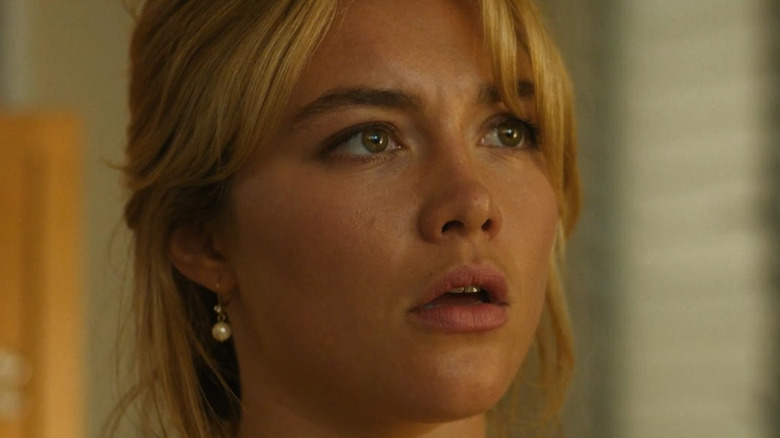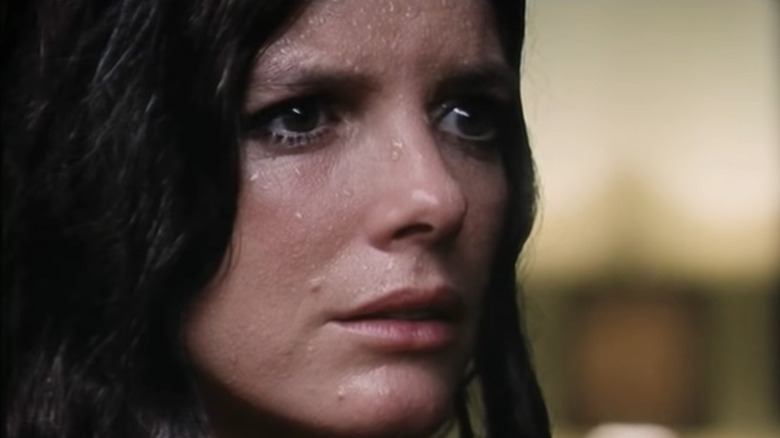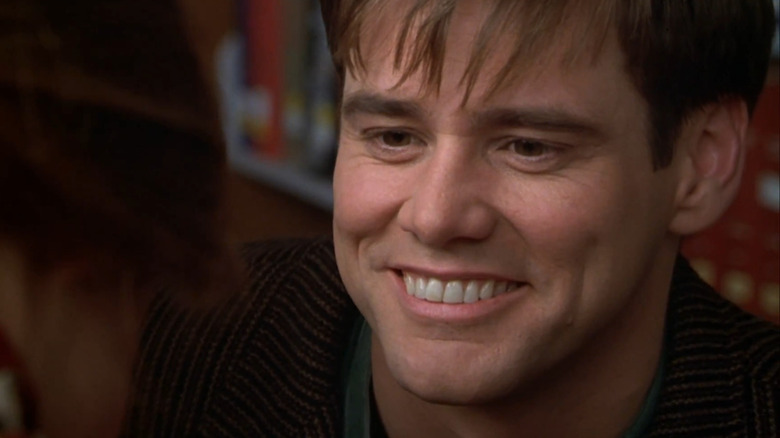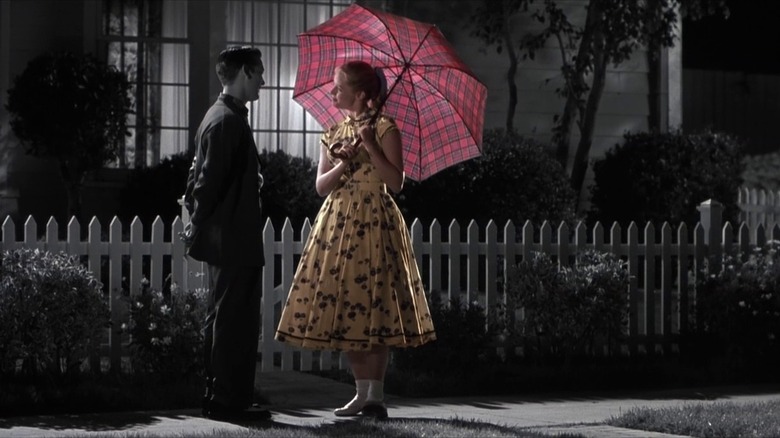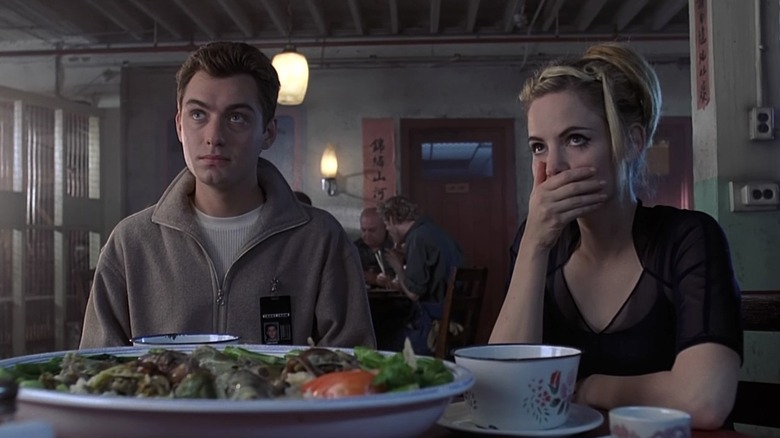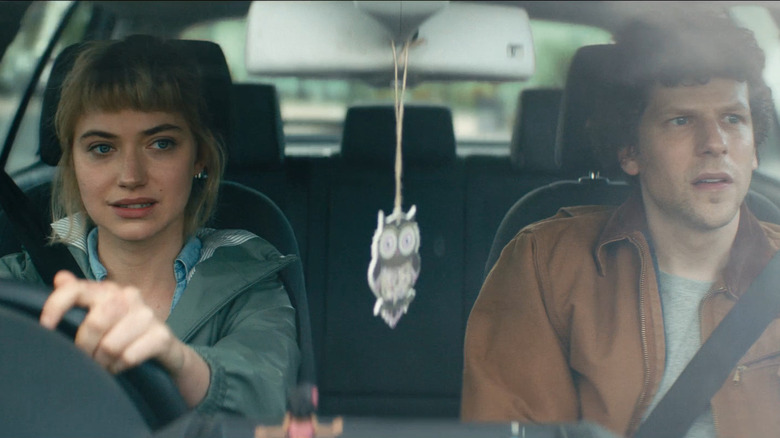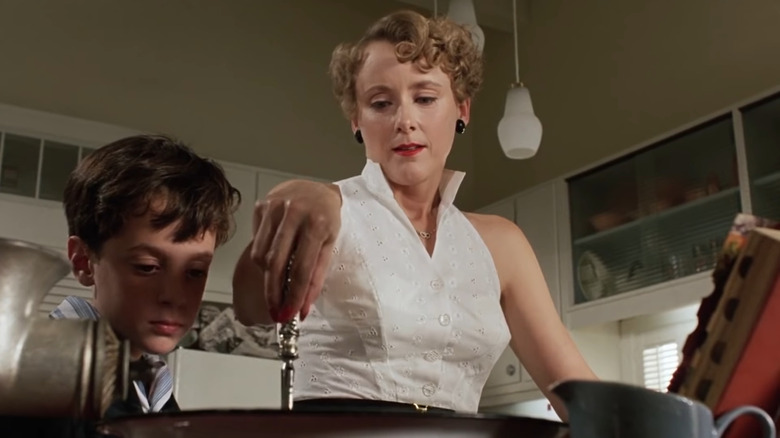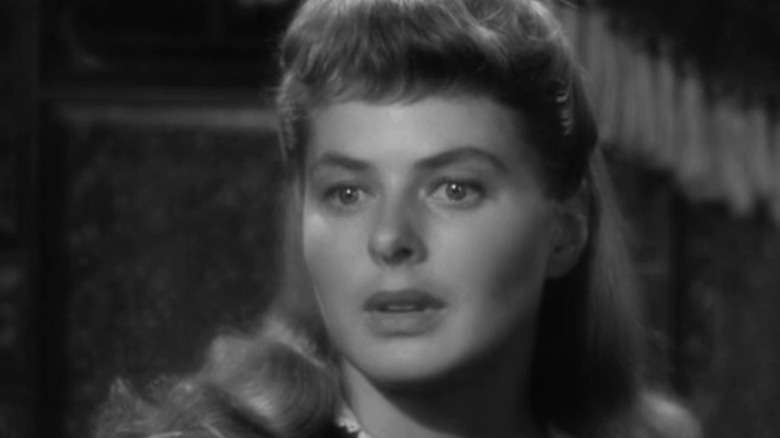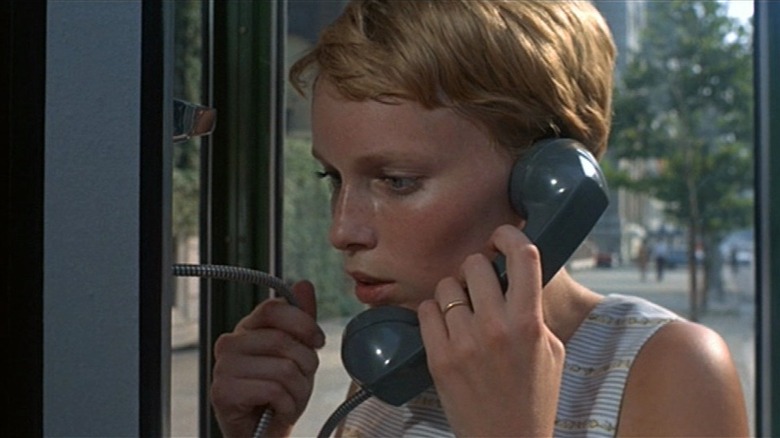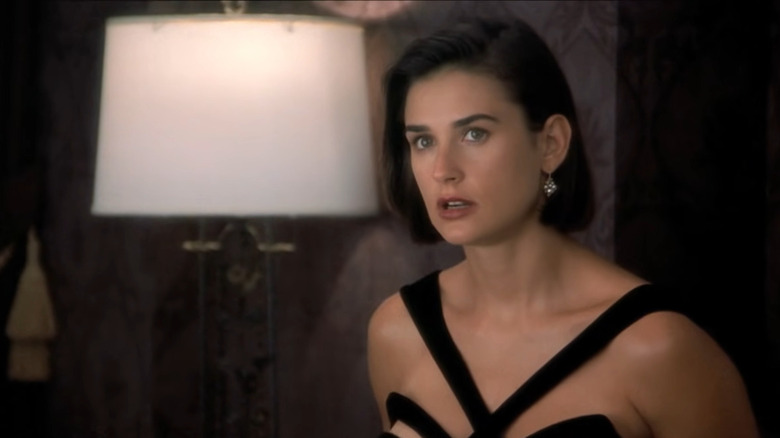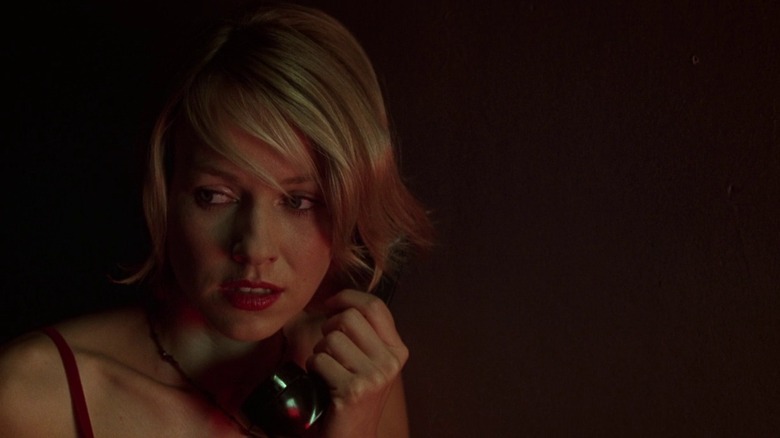10 Movies Like Don't Worry Darling You Should Watch Next
Long before it was ever shown in theaters, Olivia Wilde's "Don't Worry Darling" became one of the most talked about films of the year. The reason for all of this interest was not the content of the film itself but rather the drama surrounding its production, drama which involved Wilde, her partner and leading man Harry Styles, and the star of the film, Florence Pugh. Now that the film has actually come out (and is available to stream), we finally have something to talk about other than celebrity gossip.
The film follows Alice (Pugh) and Jack (Styles), a married couple living in a seemingly utopian 1950s suburb called Victory. Jack spends his days working at a top-secret facility run by Victory founder Frank (Chris Pine), while Alice spends her time keeping their house squeaky clean and cooking elaborate meals. If you're reading this article we're going to assume you've seen the film and thus know the twist (spoiler warning): The Victory Project is actually a virtual simulation and Alice is being held there against her will by Jack, who in the "real world" has become a regressive misogynist.
It's an interesting premise, though, it's probably not as well executed as it could have been. (The film received very lukewarm reviews from critics.) Nonetheless, the ideas it explores are certainly thought-provoking, and you might be compelled after watching it to seek out other films with similar themes. If that's the case, then you're in the right place. Keep reading to discover which movies you should watch next.
The Stepford Wives (1975)
The most obvious inspiration behind "Don't Worry Darling" is the original simulated suburb movie: "The Stepford Wives." Though the film was remade in 2004 with Nicole Kidman, we're going to focus on the 1975 version, which is usually considered the superior film.
The movie follows Joanna Eberhart (Katharine Ross), a woman who moves to the Connecticut town of Stepford with her husband and children. On the surface, the town seems absolutely perfect. But, upon closer inspection, Joanna suspects that it's a little too perfect. The women are always immaculately put-together and seem entirely devoted to their housework and attending to the needs of their husbands. Joanna sets out to investigate what is really going on in the town of Stepford, and what she finds is more horrific than she could have ever imagined.
"The Stepford Wives" has a lot in common with "Don't Worry Darling." Both follow women living in an ostensibly "perfect" suburb who discover that something sinister is happening behind the scenes. While "Don't Worry Darling" is a commentary on contemporary misogyny as exhibited by controversial figures like Jordan Peterson, "The Stepford Wives" is a clear reaction to the concerns of Second-Wave feminism and a growing distaste for domestic servitude. The two films would make a great double feature, as they both tackle similar ideas but in different cultural contexts.
The Truman Show
"The Truman Show" show is another film that has a lot in common with "Don't Worry Darling." In fact, Olivia Wilde told the audience at CinemaCon that "The Truman Show" was one of the biggest influences for her film.
"The Truman Show" stars Jim Carrey as Truman Burbank, a man who, unbeknownst to him, is the biggest television star in the country. Truman doesn't know it, but he lives his entire life on a huge TV set while hidden cameras capture his every move and broadcast his life live on TV. The executive producer of "The Truman Show," Christof (Ed Harris) tries to control Truman's actions and alter his mind, even going so far as to get rid of the woman he loves and replace her with another actress.
As Truman begins to discover the truth, his mental state deteriorates, and he must decide what to do with the information he's discovered. It's a fascinating film that bends your mind at the same time as it breaks your heart. It's one of Jim Carrey's very best performances, and Truman is an easy character to sympathize with as he struggles with defining his own agency.
If you were intrigued by the premise of "Don't Worry Darling," you'll likely find "The Truman Show" just as compelling. While "Don't Worry Darling" is a fairly dark and twisted film, "The Truman Show" is actually surprisingly optimistic considering its somewhat dystopian storyline. So, if you're looking for a simulation-themed movie where there's some hope at the end of the tunnel, "The Truman Show" is a good bet.
Pleasantville
The 1950s suburb is clearly an evocative setting for filmmakers considering how many films set their sights on exploring the unique horror and humor of these cookie-cutter landscapes. One such film is 1998's "Pleasantville," which takes a slightly more lighthearted approach to the subject matter than you might be used to. "Pleasantville" centers on two siblings, David (Toby Maguire) and Jennifer (Reese Witherspoon). Davis is obsessed with a 1950s sitcom called Pleasantville, and one day when the TV remote breaks, something strange happens. When the TV repairman comes, he gives them a special remote that transports David and Jennifer into the world of Pleasantville.
David and Jennifer become Bud and Mary Sue, the main characters of the show. David is happy to live in this new world and thinks they should just play along, while Jennifer's modern attitudes begin to rub on off the town's residents, filling their world with color (literally — as certain parts of the town begin appearing in color).
"Pleasantville" is a uniquely hopeful entry into the suburban simulation genre, as David and Jennifer find that even the most mundane circumstances can be transformed into something more lively. Witherspoon and Maguire are both delightful in these early roles, and it's a disarmingly wholesome Hollywood production. If "Don't Worry Darling" was a little too cynical for your taste, check out "Pleasantville" instead.
eXistenZ
Canadian filmmaker David Cronenberg is known as the master of body horror, and with his 1999 film "eXistenZ," he directs his twisted mind toward the virtual world. The film follows Allegra Geller (the magnificently dry Jennifer Jason Leigh), a video game designer who is the architect behind a virtual reality game called eXistenZ. After she is nearly assassinated by an unhinged fan, Allegra takes off with a young publicist, Ted (Jude Law), who is now charged with keeping her alive.
In the futuristic world of "eXistenZ," virtual reality games are accessed through "bio-ports" embedded in the human spine. Players are then able to enter these virtual worlds through a kind of umbilical cord attached to their bodies. Though Ted is fearful of virtual reality games, Allegra convinces him to enter the world of "eXistenZ" as they try to track down her would-be assassin and stop the virus that is destroying the game.
As far as virtual reality movies go, "eXistenZ" is one of the most eccentric ones out there. The means by which human beings play video games is strange enough, and the already tenuous lines between fantasy and reality begin to blur even further as the film goes on. "eXistenZ" also features some really gnarly Cronenbergian creations, including a mind-boggling gun made out of human teeth and probably the most disgusting use of Chapstick we've ever seen. If that doesn't whet your palette, we don't know what will.
Vivarium
The 2019 film "Vivarium" takes the idea of being trapped in the suburbs quite literally. The film follows Gemma (Imogen Poots) and Tom (Jesse Eisenberg), a young couple looking for an affordable place to live. Gemma and Tom travel to a suburban housing development called Yonder. After meeting with a strange real estate agent who shows them around a house, they find that he's disappeared. They try to leave the development, but every time they drive away the road leads them right back to the same house.
The next day, an infant is left on their doorstep along with a note that indicates that if they raise the child they will be released. The child grows up at an alarming rate, but Gemma and Tom are unable to escape, and things only get direr for both of them.
The themes that the film explores are nothing new, but the horrors of this suburban purgatory are well-executed and terrifying to behold. The sparse but effective production design is especially impressive, as the unique hysteria of being trapped in your own home is made strikingly apparent. The conspiracy behind this suburban nightmare is not all that mysterious, but the frights therein are no less disturbing.
Parents
The 1989 film "Parents" walks the fine line between comedy and horror, attempting to portray children's secret fears about what their parents really get up to at night. Bryan Madorsky plays Michael Laemle, a 10-year-old who suspects that something is wrong with his parents. His mother (Mary Beth Hurt) is the archetypical 1950s suburban housewife, while his father (Randy Quaid) works at a mortuary.
What Michael is most concerned about are the huge slabs of meat his father brings home at night. When he questions their origin, all his mother says is that they are "leftovers." He brings his concerns to the school counselor, Millie (Sandy Dennis), but that doesn't turn out too well for either of them.
"Parents" was neither a critical nor a commercial success at the time of its release – Roger Ebert only gave the film two stars — but it's a clever take on the equal parts hilarious and terrifying fantasies that children have about their parents. As often happens in the horror and comedy genres, the reputation of "Parents" has improved over time. Critic Adam Patterson wrote in 2019 that "'Parents' offers a unique horror-comedy experience that, while disliked by critics after its release in 1989, can now certainly be deemed a cult classic."
Gaslight
You've probably heard the term gaslighting before, but you might not know its origin. The word is used to describe an abusive situation wherein one individual manipulates another in order to make them question their own reality and judgment. It's certainly relevant to "Don't Worry Darling," as everyone in Victory works to convince Alice that the strange things she's seeing are all in her head. The origin of the term is actually the 1944 George Cukor film "Gaslight," which stars Charles Boyer and Ingrid Bergman, along with Angela Lansbury in her film debut.
Bergman plays Paula, a young woman who travels to Italy in order to train as an opera singer like her recently murdered aunt. Years later, Paula falls in love with Gregory (Boyer), her charming accompanist. When they return to the London home where her aunt was murdered, strange things begin happening and Gregory develops an obsession with the house. Paula struggles to maintain her sanity while working to uncover the secret that will explain these strange occurrences.
"Gaslight" is a film that still feels relevant today, especially considering the renewed popularity of the term itself. Though it's more of a straightforward psychological thriller than the sci-fi-tinged "Don't Worry Darling," fans of the latter film will likely appreciate this film's clever examination of misogynistic manipulation.
Rosemary's Baby
"Gaslight" may be the original gaslighting film, but "Rosemary's Baby" is one of the most famous. The first in a long line of demon pregnancy horror films, you can't get better than the original. Mia Farrow plays Rosemary Woodhouse, a young woman who moves to a new apartment building in New York City with her husband, Guy (John Cassavetes). The apartment building is strange and their neighbors are quite unusual. When Rosemary becomes pregnant and finds herself increasingly cut off from the outside world, she eventually begins to suspect something is very wrong with her baby.
The plot of "Rosemary's Baby" has been re-hashed many times since its release in 1968, making it one of the most influential horror films of all time. It absolutely still holds up and is just as frightening today as it might have been back then. There are no flashy special effects, monstrous creatures, or ghosts — only the abject terror of a woman who knows she's been violated in the most fundamental way.
Farrow's performance in the film is harrowing, and it's impossible not to be sucked into her terrifying world. The demonic nature of her pregnancy is obviously horrific, but what's just as scary is the lack of agency she has over her body and her loss of control. So many contemporary films, including "Don't Worry Darling," are indebted to the masterpiece that is "Rosemary's Baby," so if you haven't had a chance to see it yet, now's the time to change that.
Indecent Proposal
Speaking with Vogue, "Don't Worry Darling" director Olivia Wilde lamented the lack of eroticism in contemporary films. "Why isn't there any good sex in film anymore?" she asked. With that question in mind, Wilde turned to the work of famed erotic thriller director Adrian Lyne, most famous for films like "Indecent Proposal" and "Fatal Attraction." "Indecent Proposal" has an especially interesting connection to "Don't Worry Darling," as both films explore how far a couple is willing to go to secure the so-called American dream.
The film stars Woody Harrelson and Demi Moore as David and Diana Murphy, a married couple looking to invest in their future. David is an architect and Diana is a successful real estate agent, and they have just begun building their dream house when the recession hits. Desperate to save their property, they head to Las Vegas to try and win their money back. While there, they meet a billionaire (Robert Redford) who offers them $1 million to spend the night with Diana.
It's a rather preposterous premise, but, then again, most of Lyne's films are a bit outrageous. The film wasn't well-received by critics at the time of its release in 1993, but it was a box-office hit and continues to be a topic of discussion today. Wilde's assertion that films just don't do sex the way they used to is spot-on, and if you want to get a glimpse of what things were like in the good old days, "Indecent Proposal" is a pretty safe bet.
Mulholland Drive
It wouldn't exactly be accurate to call "Don't Worry Darling" Lynchian, but it does have some surreal elements that might remind viewers of the king of weird himself. David Lynch has long had a fascination with the eccentricities of the suburbs and small towns (see: "Blue Velvet" and "Twin Peaks"), but the film that most speaks to the themes of "Don't Worry Darling" is actually not suburban at all. As in "Don't Worry Darling," Lynch's 2001 masterpiece "Mulholland Drive" blurs the lines between dreams and reality, producing a totally surrealist version of the City of Angels.
The film follows Betty (Naomi Watts), a cheerful blonde from the Midwest who has come to L.A. to fulfill her dream of being an actress. While staying at her aunt's apartment, she encounters an amnesiac brunette (Laura Harring), who has wandered into the home after surviving a car crash. Betty and the mysterious woman, who calls herself Rita, find themselves on a mission to solve the mystery of Rita's identity while the landscape of underground Los Angeles shifts around them.
If you're looking for a mysterious film where all the puzzles are eventually solved, then "Mulholland Drive" might not be the movie for you. But if you're at all compelled by the notion that some things simply defy explanation, then you might be ready to take this leap. Indeed, one of the most interesting aspects of "Mulholland Drive" is that everyone has their own theories about what really happened, making it a moviegoing experience unlike any other.
